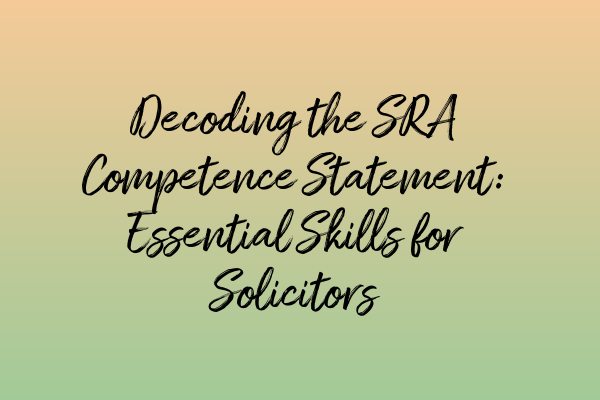Decoding the SRA Competence Statement: Essential Skills for Solicitors
Aspiring solicitors preparing for the Solicitors Qualifying Examination (SQE) must familiarize themselves with the Solicitors Regulation Authority (SRA) Competence Statement. This statement outlines the essential skills and competencies that solicitors need to possess in order to practice law effectively. Understanding these skills is crucial for success in the SQE and for future legal practice. In this blog post, we will decode the SRA Competence Statement and discuss the key skills that every solicitor should develop.
1. Legal Knowledge and Understanding
The first and most obvious skill that solicitors need is a strong foundation in legal knowledge and understanding. This includes familiarity with substantive law, legal principles, and relevant legislation. By building a solid understanding of the law, solicitors can provide accurate and effective legal advice to their clients.
Related Article: 48. Unlocking Legal Research Skills for SQE Success
2. Practical Legal Skills
In addition to legal knowledge, solicitors must also possess practical legal skills. These skills include legal research, drafting legal documents, advocating for clients, negotiation, problem-solving, and effective communication. Developing these skills is essential for solicitors to effectively handle legal matters and support their clients’ interests.
Related Article: 22. SQE1: What to Expect in the First Stage of the Solicitors Qualifying Examination
3. Legal Research and Legal Analysis
Legal research and analysis are critical skills for solicitors. They need to be able to thoroughly research legal issues, understand the relevant legal authorities, and effectively analyze the implications for their clients’ cases. Being adept at legal research and analysis enables solicitors to make well-informed decisions and provide sound legal advice.
Related Article: 48. Unlocking Legal Research Skills for SQE Success
4. Commercial and Financial Awareness
In today’s legal landscape, solicitors must also possess commercial and financial awareness. They need to understand the business context in which their clients operate and be able to provide commercially viable solutions. Developing this skill helps solicitors add value to their clients’ businesses and ensures they can provide comprehensive legal advice.
5. Working with Others
Solicitors often work as part of a legal team or alongside support staff, so the ability to work effectively with others is crucial. Collaboration, teamwork, and effective communication are essential skills for solicitors to build strong working relationships and deliver efficient legal services.
6. Equality, Diversity, and Inclusion
Equality, diversity, and inclusion should be at the forefront of a solicitor’s practice. Understanding the importance of diversity and promoting inclusivity are essential for solicitors to provide fair and unbiased legal services to all individuals. This skill fosters a more inclusive legal profession and ensures equal access to justice.
7. Ethical Leadership and Professionalism
Lastly, solicitors must demonstrate ethical leadership and professionalism in their practice. Upholding high ethical standards, maintaining client confidentiality, and acting in the best interests of their clients are fundamental principles that solicitors must adhere to. Developing this skill ensures trust and confidence in the legal profession.
Related Article: 62. SQE2: Everything You Need to Know About the Second Stage Exam
In conclusion, the SRA Competence Statement outlines the essential skills and competencies that solicitors need to possess. As aspiring solicitors prepare for the SQE, it is important to understand and develop these skills. By building a strong foundation in legal knowledge and understanding, practical legal skills, legal research and analysis, commercial and financial awareness, working with others, equality, diversity, and inclusion, as well as ethical leadership and professionalism, individuals can set themselves up for success in their legal careers.
Related Articles:
- 23. Interactive SQE Learning Tools: Gamify Your Exam Prep
- 48. Unlocking Legal Research Skills for SQE Success
- 62. SQE2: Everything You Need to Know About the Second Stage Exam
- 15. SQE Practice Areas: Choosing Your Specialization
- 22. SQE1: What to Expect in the First Stage of the Solicitors Qualifying Examination


Leave a Reply